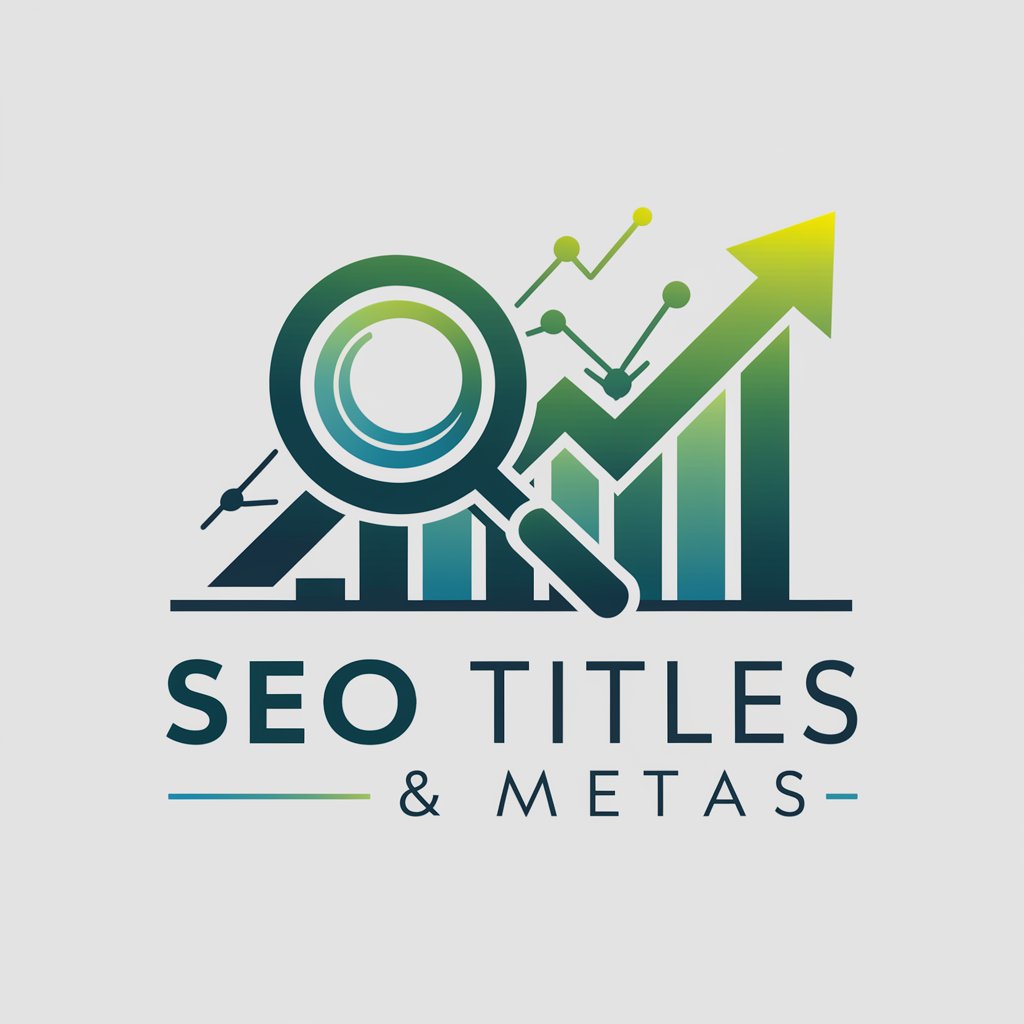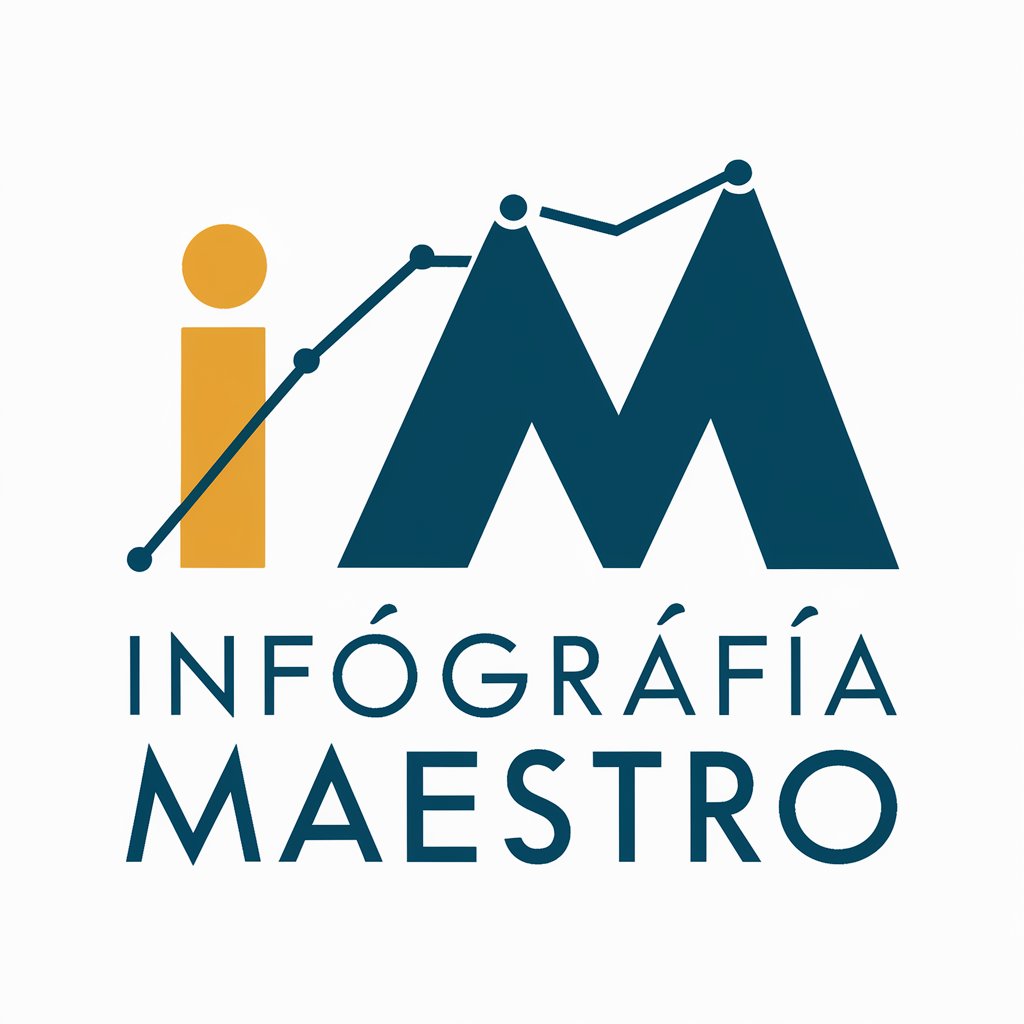SEO Titles & Metas - AI-Powered SEO Enhancement

Welcome! Let's optimize your web presence together.
Optimize Your Web Content with AI
Generate SEO-optimized page titles and meta descriptions for a website about
Create SEO-friendly metadata for a blog post discussing
Develop a list of keywords for a webpage focusing on
Optimize the title and meta description for an e-commerce product page featuring
Get Embed Code
Understanding SEO Titles & Metas
SEO Titles & Metas is designed to optimize web page titles and meta descriptions for search engines, enhancing a website's visibility and search engine ranking. The core purpose is to ensure that titles and descriptions incorporate relevant keywords and are of appropriate length, aligning with best SEO practices. For example, for a blog post about 'Healthy Breakfast Options', an optimized page title might be 'Top 10 Healthy Breakfast Options for Energy' (48 characters) and the meta description could be 'Discover the top 10 healthy breakfast options to start your day with energy. Find easy, nutritious recipes.' (144 characters). This optimization helps in improving click-through rates from search engine results pages (SERPs) by making the listings more appealing to users and relevant to their search queries. Powered by ChatGPT-4o。

Key Functions of SEO Titles & Metas
Keyword Optimization
Example
For a page selling 'organic green tea', incorporating key phrases like 'Buy Organic Green Tea Online' in the title and 'Explore our premium selection of organic green tea. Perfect for health-conscious tea lovers.' in the meta description.
Scenario
An e-commerce website wants to improve its organic search visibility for specific products. Using SEO Titles & Metas, the product pages are optimized with relevant keywords to match potential search queries.
Length Optimization
Example
Adjusting a page title from 'The Comprehensive Guide to Mediterranean Diet Benefits, Recipes, and More' to 'Mediterranean Diet Guide: Benefits & Recipes' (55 characters) and shortening a lengthy meta description to fit within the 155-character limit.
Scenario
A health and wellness blog needs to ensure its article titles and descriptions are concise and within SEO best practices for length, making them more likely to be displayed fully in SERP listings.
Content Summarization
Example
For a tutorial page about 'How to Install WordPress', creating a meta description like 'Step-by-step guide to installing WordPress for beginners. Learn to set up your website quickly and efficiently.' (138 characters).
Scenario
A technology tutorial website seeks to enhance the click-through rate from SERPs by providing clear, concise summaries of what users can expect to learn or achieve by visiting their pages.
Who Benefits from SEO Titles & Metas?
Digital Marketers
Professionals tasked with increasing a website's visibility and user engagement. They use SEO Titles & Metas to ensure web content is optimized for search engines, aiding in higher rankings and improved click-through rates from SERPs.
Content Creators
Bloggers, writers, and multimedia content producers who aim to reach a wider audience. Optimizing titles and meta descriptions helps their content to be discovered more easily and appear more relevant to search queries.
E-commerce Managers
Individuals responsible for online sales performance. By optimizing product page titles and descriptions, they can attract more qualified traffic and improve the search visibility of their products.
SEO Specialists
Experts focused on improving a site's overall search engine rankings. They leverage SEO Titles & Metas to fine-tune web content, ensuring it meets the latest SEO standards and practices for maximum impact.

How to Utilize SEO Titles & Metas Effectively
Start Your Journey
Commence by visiting yeschat.ai for a complimentary trial, accessible without the necessity for login or a subscription to ChatGPT Plus.
Identify Your Needs
Determine the specific web pages or content types for which you require SEO-optimized titles and meta descriptions. This could range from blog posts to product pages.
Prepare Your Content
Gather or prepare the content of your web pages. Understanding the main topics and key phrases is essential for creating effective SEO titles and meta descriptions.
Generate SEO Elements
Use the SEO Titles & Metas tool to input your page content. The tool will then generate optimized titles and meta descriptions based on your content's key SEO phrases.
Implement and Analyze
Apply the generated titles and meta descriptions to your web pages. Monitor your site's performance in search engine results and adjust as necessary for continuous improvement.
Try other advanced and practical GPTs
Character Creator - SPAWN LLC
Crafting Detailed Characters with AI

Location History Analyzer
Unveil your journeys, AI-powered insights

Automated Tasks
Automate tasks with AI precision

Infografía Maestro
Simplify your story, design with AI.

Visualizador Criativo
Crafting visuals with AI imagination

Shorts Blaster GPT by Uply Media Inc
Amplify Your Video Reach with AI Power

Fermentation
Unlock the art of fermentation with AI

CCNA Study Buddy (Study and Exam)
Your AI-Powered Path to CCNA Mastery

Case Study Generator
Crafting Insightful Case Studies with AI

Case Study Bot
Craft Compelling Case Studies with AI

Study-AI Navigator
Navigating AI Education with Precision

Study Helper
Empowering your study journey with AI.

Frequently Asked Questions about SEO Titles & Metas
What makes SEO Titles & Metas unique?
SEO Titles & Metas stands out for its AI-driven approach to generating optimized page titles and meta descriptions, specifically tailored to enhance search engine visibility and engagement.
Can SEO Titles & Metas help with non-English websites?
Yes, while it primarily uses British English, the tool can be adapted to support SEO optimization for web pages in other languages, focusing on the relevant keywords and phrases for each language.
How often should I update my SEO titles and meta descriptions?
It's advisable to review and potentially update your SEO elements periodically, especially when there are significant changes to your content, to reflect new keywords or improve search rankings.
Does SEO Titles & Metas support bulk processing?
The tool is designed to optimize individual pages to ensure the highest level of customization and effectiveness, rather than bulk processing, which might not cater to the unique aspects of each page.
How does SEO Titles & Metas adapt to the latest SEO trends?
The AI algorithms behind SEO Titles & Metas are continuously updated to align with the latest SEO practices and search engine algorithms, ensuring your titles and meta descriptions remain effective over time.
